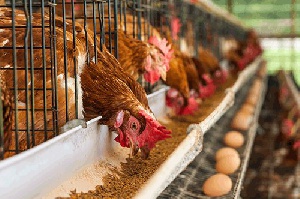The government has been asked to take urgent steps to revamp and give a new lease of life to the nation’s collapsing poultry industry.
Mr. John Bewuah Edusei, Spokesperson of the Ghana Poultry Farmers Association, said it was not looking good as their businesses continued to struggle.
Addressing a press conference in Kumasi, he indicated that, if supported to operate more efficiently, the industry was one area that could create jobs and wealth for the people.
He appealed for closer examination of the ‘Broiler Project’, introduced in year 2014, to get things streamlined to aid the farmers to acquire processing plants, regulate chicken importation and provide ready market for their products.
The goal of the project is to cut chicken importation by 40 per cent by assisting the farmers to go into large scale production of broilers to meet the local demand.
Mr. Edusei said about 70 per cent of the farmers who had produced birds for the last Christmas festivities had all gone bankrupt due to poor sales.
He added that “the investment we made, just went down the drain”.
He complained about what he said was the industry’s lack of recognition, saying, it was the only sector under the Ministry of Food and Agriculture (MoFA), which had been sidelined.
He maintained that not a single poultry farmer was recognized with an award at last year’s Farmers’ Day Celebration.
Ghana has averagely been importing about 250,000 metric tons of chicken and five million day-old chicks annually.
He said the nation could learn from neighboring countries like Cote d’Ivoire, Burkina Faso and Nigeria, where chicken importation had been banned to save the local industry.
He noted that for every one million broilers produced locally, close to about 100, 000 jobs could be created along the production value chain.
Click to view details



Business News of Monday, 8 January 2018
Source: ghananewsagency.org
Take steps to save collapsing poultry industry - Association
Opinions
















